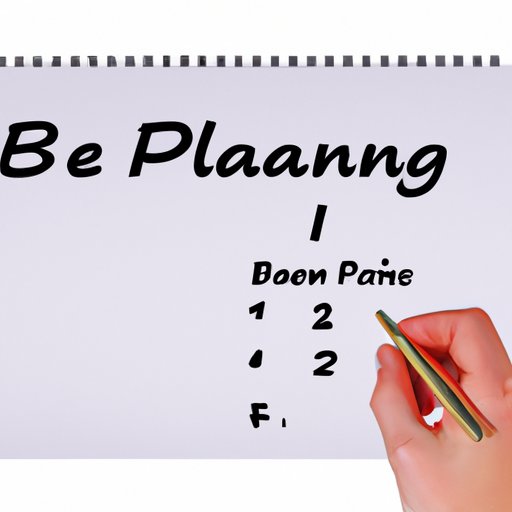
Introduction
Unprotected sex can happen for various reasons, and the consequences of unintended pregnancy can be overwhelming. Emergency contraception, such as Plan B, can significantly reduce the risk of pregnancy when taken within a specific timeframe. However, taking it can feel intimidating, and there are often misconceptions surrounding the medication. This article serves as a comprehensive guide, so you know precisely how to take Plan B in an emergency situation.
Step-by-Step Guide
Purchasing Plan B
Plan B is available over-the-counter at most drug stores and pharmacies and does not require a prescription. However, you must be 18 years or older to purchase it without a prescription. Depending on your location, you may need to visit the pharmacy counter to obtain Plan B.
Preparation before taking the pill
Before taking Plan B, make sure to examine the packaging and read the instructions carefully. Plan B works best when taken as soon as possible after unprotected sex. Keep in mind; it’s not too late to take it even a few days after unprotected sex. However, the longer you wait, the higher the risk of pregnancy. If you’re not sure whether Plan B is the right choice or if you have medical concerns, speaking to a healthcare provider is advisable.
Taking the pill
Plan B is a one-pill regimen. Take it as soon as possible after unprotected sex, irrespective of whether you’ve ovulated or had your period. Take the pill orally, preferably with a glass of water. You may feel nauseous after taking the pill. Still, it’s nothing to worry about, and you can take an over-the-counter anti-nausea medication like Dramamine if needed.
Dealing with possible side effects after taking the pill
Plan B is safe and effective, but like most medications, there can be side effects. The most common side effects are headaches, nausea, abdominal pain, fatigue, and irregular periods. If you experience severe abdominal pain or heavy vaginal bleeding, you should contact your healthcare provider immediately.
Importance of follow-up with healthcare provider
Follow-up with a healthcare provider after taking Plan B is essential. It’s a good opportunity to discuss more effective forms of birth control and to address questions about potential side effects or any other concerns regarding sexual and reproductive health.
Common Myths
Safety of Plan B
Plan B is extremely safe and does not have any long-term effects on fertility or pregnancy. However, Plan B is not an abortion pill and will not terminate an existing pregnancy.
Timing of Plan B
Plan B is effective up to five days after unprotected sex. However, it is most effective when taken within 24 hours of unprotected sex.
Side effects of Plan B
Plan B can have side effects like nausea, headaches, and abdominal pain. However, these side effects are generally mild and go away without intervention.
Dispelling common misconceptions about Plan B
There are numerous misconceptions about Plan B, including that it causes abortion, fertility problems, and long-term reproductive health issues. However, these are all false and unfounded claims.
Video Tutorial
For additional guidance, we recommend watching a tutorial video on how to take Plan B. Here’s a link to a video that covers everything discussed in this guide:
https://www.plannedparenthood.org/learn/morning-after-pill-emergency-contraception/how-do-i-use-emergency-contraception
Personal Experience
While taking Plan B may feel uncomfortable, it’s essential to know that you’re not alone. Many people have gone through the same experience and have come out stronger. If you’re hesitant about taking Plan B, speaking to someone who has been through it can help.
Alternatives to Plan B
While Plan B is a safe and effective emergency contraceptive option, it’s not the only choice available. Other suitable options include copper IUDs (intrauterine devices) and taking daily birth control pills in the days following unprotected sex. However, these options require a more extended commitment and may not be as readily available.
Timing Guidance
The faster you take Plan B after unprotected sex, the more effective it is. It’s best to take Plan B as soon as possible, but it can be taken up to five days after unprotected sex.
Importance of Timing and Dispelling Misconceptions
Many believe that Plan B is no longer effective after 72 hours, but research suggests that it can still be up to 80% effective five days after unprotected sex. However, the longer you wait, the less effective Plan B becomes. Therefore, it’s crucial to take it as soon as possible.
Effect on Menstrual Cycle
Plan B can impact menstrual cycles. It can cause changes in the timing, duration, and intensity of periods. Some women may experience bleeding or spotting after taking Plan B, but it’s normal and is usually not a cause for concern.
Conclusion
Knowing how to take Plan B is essential, irrespective of whether you’re actively using birth control methods. As soon as you realize that you’ve had unprotected sex and are concerned about unwanted pregnancy, it’s important to act quickly. Plan B is a safe and effective method that can reduce the risk of pregnancy when taken correctly. If you have concerns about Plan B or any other sexual and reproductive health issues, speaking to a healthcare provider is highly advisable. Remember, you’re not alone, and asking for help is always the right choice.





